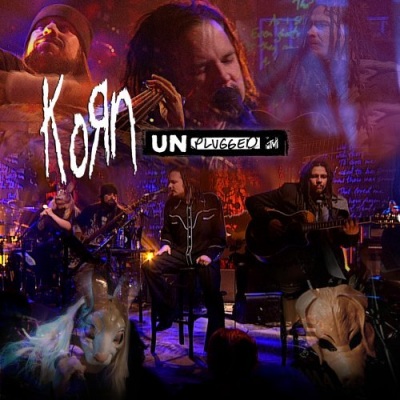
MTV Unplugged
by Stephen Thomas Erlewine What does a band do after teenage angst has paid off well, leaving them bored and old? In Korn's case, they turn to that evergreen bastion of respectability, MTV Unplugged. During the mid-'90s, it was standard practice for any major rock artist to venture onto the program and prove their worth as "authentic" musicians -- the old canard being that only real musicians and real songs can withstand the scrutiny of such unadorned arrangements, even if the arrangements by 1996 were becoming so ornate they barely passed as acoustic -- but by the turn of the decade the show fell out of fashion. It was revived every couple years by major artists in need of either a stopgap release or boost of energy -- Lauryn Hill's bizarre 2002 affair, Alicia Keys' perfectly respectable but uneventful 2005 set -- which pretty much described Korn to a tee in 2007. They were veterans slightly past their prime, still capable of reaching the Top Ten with their new albums but playing to an ever-more-selective audience, as they lurched toward reinvention without luring in new listeners or settling into their inevitable middle age. So, after the modest success of 2005's See You on the Other Side, it was time for an MTV Unplugged, a drastic move backward from the heavy hip-hop inflections of See You. If that was a party record designed to snare younger listeners, this is an album for the long-term fans who have been with them for nearly 15 years, who are also in their thirties and are inclined toward moodier, quieter material. At least that's the intention of Korn's MTV Unplugged, but in practice the record is a bit of an unholy mess for one simple reason: apart from Rage Against the Machine, there is no other '90s hard rock band as ill-suited to the stripped-back conceit of MTV Unplugged than Korn. It's not a question of authenticity, it's a question of aesthetic: without amplification, without electric beats and guitars, the band loses its identity and all its purpose. The guitars still spin out fast and furious, the basslines are still ropy and elastic, but they sound anemic when not run through high voltage; the band sounds like its playing electric guitars unplugged, not acoustic. Without walls of noise to support him, it's impossible to ignore how thin and reedy Jonathan Davis' voice is. At his best, Davis sounds coiled and nervy, giving voice to the torment his lyrics can't articulate, but in this setting, he sounds petulant, an adult who refuses to believe his adolescence is long behind him. Which is appropriate, since despite the very existence of this album, Korn does not acknowledge that they're now adults. Even their attempts to stretch out to new sounds are typical of tormented teens: they cover Radiohead's "Creep" and the Cure. These moves can't help but bring to mind other, defter new metal bands like the Deftones who assimilate the Cure's influence where Korn merely apes it. Worse still, inviting Evanescence's Amy Lee for a duet on "Freak on a Leash" only makes Korn seem uncomfortably close to such leaden '90s revivalists as Seether, a clear sign that this band is now adrift at sea and uncertain how to find their way back to land.
